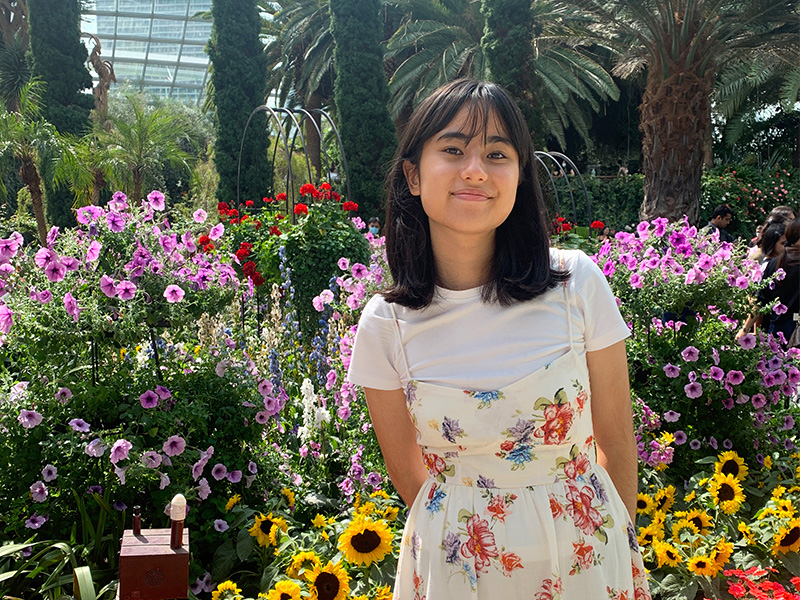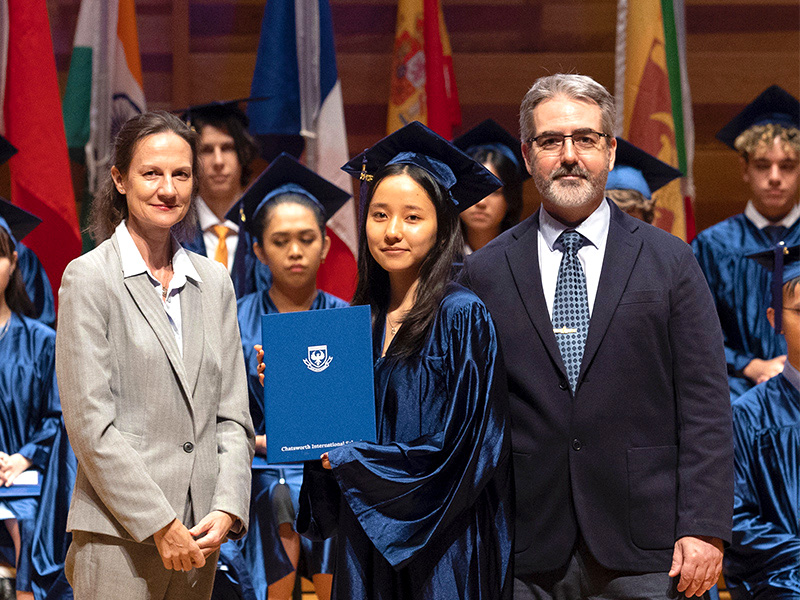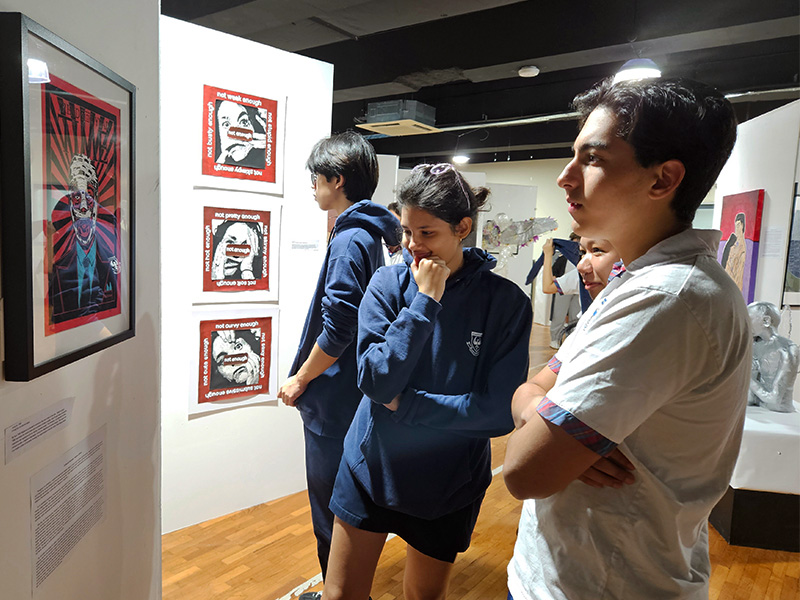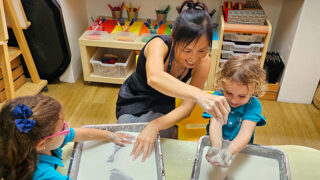The International Baccalaureate Diploma Programme (IBDP) is known to be a challenging school programme in its own right. But imagine doing it in two different languages – and with great success! That’s what students from Chatsworth International School’s Class of 2023 did, when they sat for their IB Bilingual Diploma examinations.
Chatsworth students on the International Baccalaureate Diploma Programme achieved a 96.3% pass rate, a school average of 36 points and a top score of 44 points. And 27% of this graduating cohort earned the bilingual diploma – and with a 100% pass rate! – after taking the IB Diploma School-supported Self-taught Language A Literature at Chatsworth.
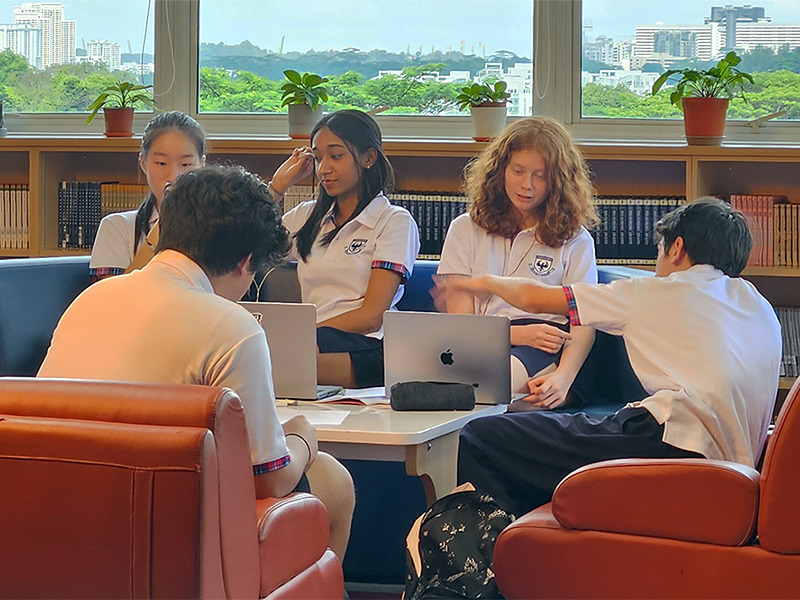
To achieve this bilingual diploma, IBDP candidates have to complete and receive a grade 3 or higher in two languages selected from the course studies, as well as a grade 3 or higher in an Individuals and Societies or Science subject that’s completed in a different language.
We hear from two of Chatsworth’s 2023 graduates who obtained the bilingual diploma. They tell us about their experience and how the bilingual programme has helped them in achieving their outstanding results.
# Lilowen Trottet, French
Lilowen started in K2 with Chatsworth and obtained 44 points to be the school’s top IB scorer. She achieved a bilingual diploma in English and French, and she has also learnt Mandarin. Lilowen is currently enrolled in the Bachelor of Arts in Character Animation and Animated Filmmaking programme at Gobelins Paris.
Why did you decide to pursue a bilingual IB diploma in French and English?
I wanted to challenge myself to excel in both languages. I feel that my French is slightly weaker so taking it at Language A Level really pushed me to improve. Furthermore, the books that I read during my International Baccalaureate Diploma Programme gave me a greater awareness of French literature as a whole, which I found very valuable.
Were there any particular challenges in learning and becoming highly proficient in three languages – French, English, Mandarin – at the same time?
I definitely had to make an extra effort outside of school to continue reading and writing in French, as I would speak and study mainly in English throughout the day.
I also did learn Mandarin as a second language from Y7 to Y10, and I felt that this was valuable especially living in Singapore, where Mandarin is very widespread. However, I never became proficient enough to be able to confidently communicate in Mandarin, so this is definitely something that I wish to continue working on in the future!
How did this affect your International Baccalaureate Diploma Programme journey at Chatsworth?
It helped me to not only be perseverant in my studies, but also to develop skills in academic writing. These are skills that I could transfer to many of my other subjects, which is a great advantage overall.
How different do you think your life would be without the bilingual programme?
The bilingual programme pushed me to interact with French language and literature. This allowed me to broaden my literary horizons and to gain confidence in speaking and writing in my mother tongue. I think that if I hadn’t pursued this programme, I wouldn’t be as comfortable using French in my daily life in Paris.
Describe an incident when you spoke French in Paris and how it helped you.
The art school that I currently attend has both a French and International class. Being able to speak French and English has helped me to connect with more of my classmates.
What advice would you give to students preparing for their IB exams, in particular for someone taking a bilingual diploma?
It’s more important to study regularly for exams and give yourself breaks, rather than study intensively at the expense of your wellbeing. It’s also a good idea to talk to your teachers if you have any doubts about the exam structure or syllabus content.
For those taking a bilingual diploma, it’s very helpful to also practise your mother tongue in your free time. This could be reading a book, watching a movie or just having conversations with friends or family, all in your mother tongue.
# Minami Mochizuki, Japanese
Minami joined Chatsworth in Year 11 and spent three years with the school. She achieved a bilingual diploma in English and Japanese. Minami is enrolled in Global Studies under the Sophia Program for Sustainable Futures at Sophia University in Tokyo, Japan.
Why did you decide to pursue a bilingual diploma in English and Japanese?
Japanese is my first language – I’d completed my elementary school years in it before I moved to Singapore in 2017 at 12 years old. Since I’d been in the Japanese class instead of a second language program during MYP, I felt more comfortable to pursue a IBDP bilingual diploma than to pick up a whole new language.
As a Year 11 student not knowing how well I would do academically in the International Baccalaureate Diploma Programme, it was very important for me to have this sense of assurance that I have the skills to complete tasks at the levels expected in IBDP.
Were there any particular challenges when joining the bilingual programme in Year 12?
I was the only student in the MYP Japanese Language & Literature course in Year 11. Moving into Year 12, I switched to the general mother tongue programme. It was a helpful transition because I had classmates. Having classmates to discuss global issues found in prescribed books helped me look at them from a new angle and deepen my understanding.
How different do you think your life would be without the bilingual programme?
Living abroad and taking classes in English led to attrition in my Japanese language abilities, especially in writing. The continual cycle of reading, analysing and writing in Japanese for two years of the bilingual programme has helped me in retrieving and maintaining my abilities at an academic level.
It also opened doors to a variety of opportunities for me – I didn’t need to look for exclusively English-taught courses when looking for a university in Japan.
Describe an incident when you spoke English in Japan and whether it was funny or helped you.
There have been multiple instances where I know a word in English but not in Japanese, and vice versa. I find it kind of funny that the bilingual struggle is inevitable no matter how proficient you get at a language, and it always happens in moments when you want to appear smart.
What advice would you give to students preparing for their IB Diploma exams, in particular for someone taking a bilingual diploma?
Your grades in the first semester don’t fully reflect your abilities. So give yourself the first year to get used to the assessments and don’t stress too much!
About School-Supported Self-Taught Literature A in the International Baccalaureate Diploma Programme at Chatsworth
This two-year course is part of the Studies in Language and Literature group. It’s offered in Years 12 and 13 at Chatsworth at a Standard Level. It focuses on the development of literature skills in the student’s mother tongue.
There’s a broad range of languages available at Chatsworth for SSST Language A Literature. There are two pathways for students to earn a IBDP bilingual diploma:
- Bilingual Pathway 1: Group 1 School-supported self-taught Language A Literature; Group 2 Language Acquisition English B
- Bilingual Pathway 2: Group 1 English A Language and Literature; Group 1 School-supported self-taught Language A Literature
About the Mother Tongue Language Programme in the Middle Years Programme at Chatsworth
The school’s Mother Tongue Language programme is offered from Years 7 to 13. It’s supported by external mother tongue tutors/teachers who are fully trained in IBDP concepts and assessment. All internal and external assessments are completed in the target language before being assessed externally.
Chatsworth International School
72 Bukit Tinggi Road
6463 3201 | chatsworth.com.sg
Head to our Kids section to learn more about international schools in Singapore as well as all the fun things to do for kids.

